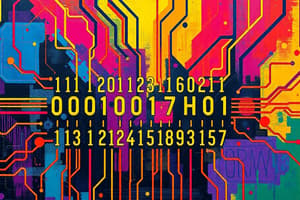Podcast
Questions and Answers
What type of technology is most commonly used in optical encoders?
What type of technology is most commonly used in optical encoders?
- Resistive
- Interrupting light (correct)
- Magnetic
- Mechanical
What is the primary difference between incremental and absolute encoders?
What is the primary difference between incremental and absolute encoders?
- Incremental encoders use mechanical technology, while absolute encoders use optical technology.
- Incremental encoders are more accurate than absolute encoders.
- Incremental encoders are used for machine control, while absolute encoders are used for robotics.
- Incremental encoders provide an indication of position change, while absolute encoders indicate both position change and absolute position. (correct)
Which of the following is NOT an application of encoders?
Which of the following is NOT an application of encoders?
- Machine control
- Natural language processing
- Analog-to-digital conversion (correct)
- Robotics
What is the primary function of encoders in digital systems?
What is the primary function of encoders in digital systems?
What is the key advantage of using optical technology in encoders?
What is the key advantage of using optical technology in encoders?
What is the primary role of encoders in digital logic?
What is the primary role of encoders in digital logic?
How do encoders help in reducing errors in information transmission?
How do encoders help in reducing errors in information transmission?
Which type of encoders assigns a unique binary code based on priority or weight?
Which type of encoders assigns a unique binary code based on priority or weight?
In what situations are encoders particularly useful?
In what situations are encoders particularly useful?
What are encoder-decoder models commonly used for in natural language processing tasks?
What are encoder-decoder models commonly used for in natural language processing tasks?
Which industry or application employs digital incremental encoders for feedback sensing?
Which industry or application employs digital incremental encoders for feedback sensing?
Flashcards are hidden until you start studying
Study Notes
Encode
Introduction
Encoders play a crucial role in digital logic for converting a set of binary inputs into a unique binary code. These devices are designed to represent the position of a particular input, allowing digital systems to uniquely identify the active input among others.
Functionality
Encoders operate on the principle of encoding multiple inputs into a single serial code. By doing so, encoders reduce the possibility of errors in the transmission of information, enhancing system performance and reliability. There are several types of encoders, including 4 to 2 encoders, which assign a unique binary code to each input based on their priority or weight.
Applications
Encoders have wide applications across various digital systems and industries, primarily used for converting parallel inputs into serial codes. They are particularly useful in situations where the number of inputs is large and needs to be reduced to a single output that can be easily transmitted or processed further. Examples include robotics, industrial equipment, and consumer products, which employ digital incremental encoders for feedback sensing.
Encoder-Decoder Models
In natural language processing tasks, encoder-decoder models are commonly employed for understanding complex mappings between input and output sequences. These models are especially effective for text translation and summarization tasks.
Incremental Encoders
Incremental encoders use either mechanical, magnetic, resistive, or optical technologies to create signals based on motion changes. Optical encoders are most common and work by interrupting light as the shaft rotates, producing a pulse signal. Encoders may produce incremental or absolute signals, with the former providing only an indication of position change and the latter indicating both position change and the absolute position of the encoder.
Conclusion
Encoders serve as essential components in digital logic, allowing for efficient conversion of multiple binary inputs into an easily processable serial code. Their application spans across various fields, from machine control and robotics to natural language processing and artificial intelligence, making them versatile tools for enhancing the performance of digital systems.
Studying That Suits You
Use AI to generate personalized quizzes and flashcards to suit your learning preferences.




